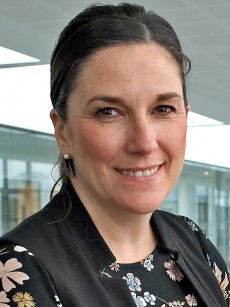
Passion for work-based learning lands Fiona a quality job
Fiona Argent, 51, from Hengoed, Caerphilly, has been appointed head of work-based learning quality after moving from Cardiff Metropolitan University where she was manager of the Centre for Work-based Learning for more than six years.
The NTfW is a membership organisation of more than 70 quality assured work-based learning providers with links to thousands of employers across Wales. The providers deliver learning programmes ranging from Traineeships to Higher Apprenticeships for the Welsh Government.
“This is a great job and something I am very passionate about,” said Fiona. “It was a challenge I could not miss out on. What really attracted me was the focus on professional work-based learning practitioners and developing a set of standards that will continue to provide development for the workforce.
“I think being a work-based learning practitioner is the most multi-faceted of all teaching and educational jobs. You are expected to assess, teach, coach, prepare lessons and facilitate effective learning. It’s a professional job and it’s time it had that recognition.
“We are on the cusp of something really exciting, especially with the professional development and benchmarking of work-based learning practitioners. The Education Workforce Council is now recognising the role alongside further education and mainstream education.”
She said the Covid-19 pandemic had accelerated the use of digital learning platforms by training providers to support learners. The next step would be to ensure that these platforms were used even more effectively.
“I am joining a very busy and vibrant network where there is a passion for learners and learning and increased stakeholder engagement,” added Fiona. “The management of work-based learning and the way it is controlled in Wales is very beneficial.
“Quality is at the core of our provision and must be perceived that way by not only the learners but also the employers and the Welsh Government. The quality of provision is underpinned by effective learning and teaching and is driven by employers, the majority of whom pay the apprenticeship levy, and they have a platform to express their views at Regional Skills Partnerships.
“As work-based learning providers, it’s essential that we continue to offer value for money and that we provide transformational rather than transactional learning.”
Fiona is married to Simon, a HR director, and they have two children, Harriet, 22 and Jacob, 19. She studied hospitality management at Brighton Polytechnic before doing a postgraduate diploma in personnel and human resources and is a Fellow of the Chartered Institute of People and Development (FCIPD). More recently, she has completed an Executive MBA at Cardiff Metropolitan University.
Her training and development career began at Ebbw Vale Garden Festival in 1991 before joining Link Training as regional training and quality manager for six years. She then became a self-employed training and development consultant for nine years, including five year as a human resources development and an Investors in People adviser on behalf of the Welsh Government.
Seven years followed as head of delivery for Acorn (now ALS) before joining Cardiff Metropolitan University.
Jeff Protheroe, the NTfW’s director of operations, said: “Fiona’s appointment to this hugely important role for the apprenticeships provider network, comes at a time of significant change for the Welsh economy.
“Apprenticeships have been, and no doubt will always be, at the cornerstone of workforce development in Wales. Therefore, it is imperative that all apprenticeships are of the highest possible quality, both for employers and individuals.
“Wales has an enviable apprenticeship programme, and there is a great deal of work going on at the moment to ensure that it becomes world-class. Fiona will be at the centre of these developments, with a specific focus on developing our professional workforce further, in order that the quality of apprenticeships goes from strength to strength.”
More News Articles
« CITB apprentice Zoe Evans painting a picture of success — Dafydd continuing his learning journey during pandemic »


